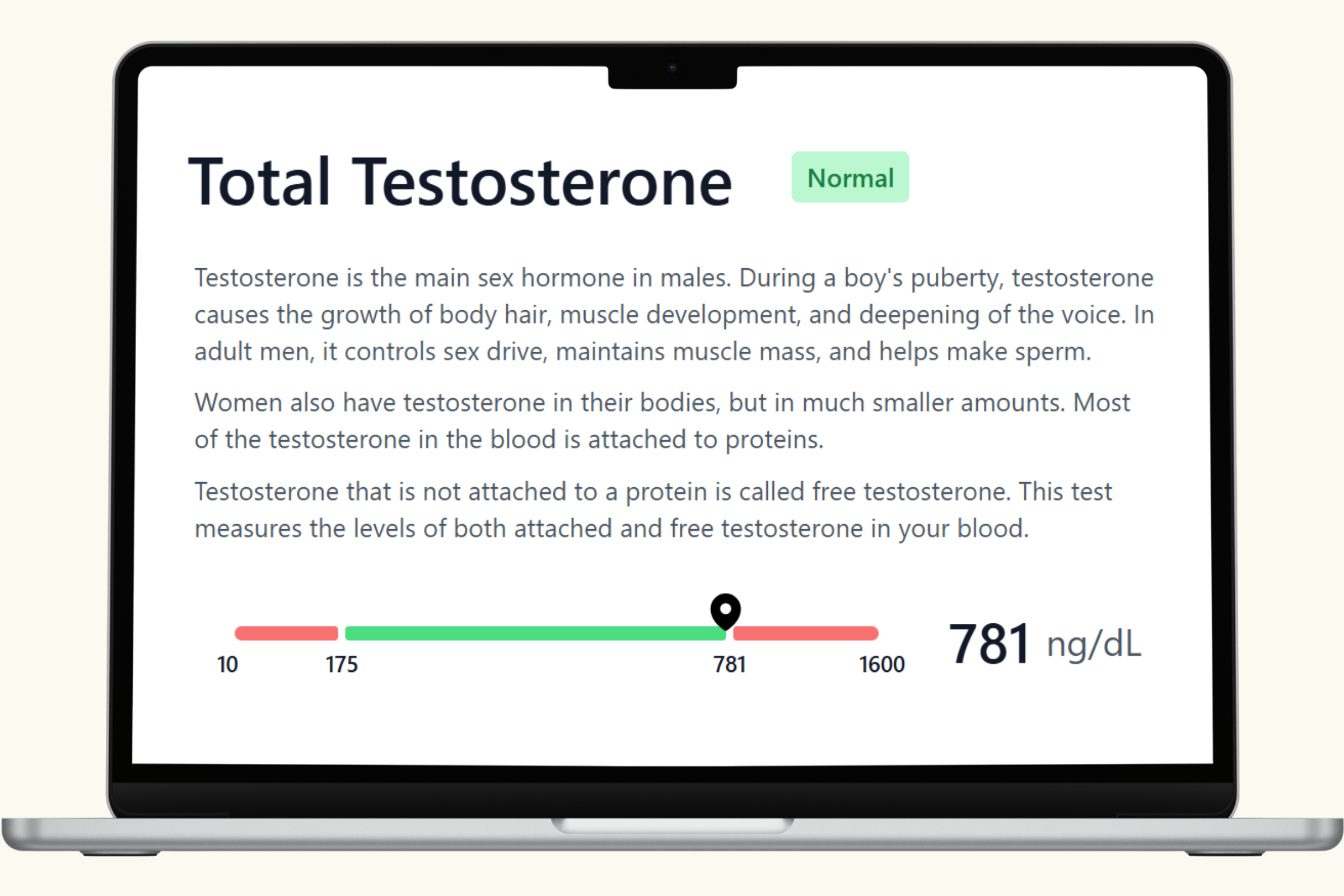Total Testosterone Blood Test: The Foundation of Male Hormonal Health
Testosterone is often referred to as the cornerstone of male health, and for good reason. It influences nearly every aspect of physical, reproductive, and cognitive function. While free testosterone represents the active fraction of the hormone, the Total Testosterone Blood Test provides an overall view by measuring both free and protein-bound testosterone. This makes it one of the most widely used tests for evaluating male hormone balance.
The PlexusDx Men’s Health & Wellness Blood Test includes measurement of total testosterone through a simple at-home dried blood spot collection using an ADX card. This convenient method eliminates the need for a clinic visit while still delivering clinically relevant results that can be shared with your healthcare provider.
What is Total Testosterone?
In men, testosterone is produced primarily in the testes, with smaller amounts made by the adrenal glands. In women, the ovaries also produce small quantities. In circulation, testosterone exists in two forms:
- Free testosterone (2 to 3 percent): Unbound and biologically active.
- Protein-bound testosterone (about 97 to 98 percent): Attached to proteins such as sex hormone-binding globulin (SHBG) or albumin. This portion acts as a reservoir and maintains hormone balance over time.
The total testosterone measurement combines both free and bound forms, offering a comprehensive overview of hormone status.
Why Total Testosterone Matters for Men
1. Bone Density and Strength
Testosterone helps maintain strong bones by promoting bone mineralization. Low levels increase the risk of osteoporosis and fractures, particularly with age.
2. Muscle Mass and Physical Performance
Adequate testosterone is essential for muscle growth, strength, and exercise recovery. Men with lower testosterone levels often experience muscle loss, reduced endurance, and decreased physical performance.
3. Red Blood Cell Production
Testosterone stimulates red blood cell formation in the bone marrow, supporting oxygen delivery and energy levels. Low testosterone may contribute to fatigue and anemia-like symptoms.
4. Libido and Sexual Health
Testosterone is the primary driver of sex drive and erectile function in men. Low levels are strongly associated with reduced libido and sexual performance concerns.
5. Mood and Cognitive Function
Testosterone affects neurotransmitters and brain function, contributing to mood stability, memory, and focus. Men with low testosterone often report depression, irritability, brain fog, or reduced motivation.
6. Aging and Energy Levels
Testosterone levels peak in early adulthood and naturally decline by about 1 percent per year after age 30. This decline can lead to symptoms commonly associated with andropause, such as low energy, weight gain, mood changes, and decreased vitality.
How Total Testosterone is Measured
The PlexusDx Men’s Health & Wellness Blood Test measures total testosterone from a dried blood spot sample. This method is accurate, non-invasive, and convenient for at-home collection. Because testosterone levels fluctuate throughout the day, samples are typically collected in the morning when levels are at their highest for the most consistent results.
Reference Ranges for Total Testosterone in Men
Reference ranges vary slightly by lab and method, but commonly reported values for adult men are:
- Standard (conventional) range: 300 – 1,000 ng/dL
- Functional/optimal range: 500 – 800 ng/dL
These ranges provide context for evaluating whether symptoms such as fatigue, low libido, or mood changes may be linked to testosterone imbalance.
What Low Total Testosterone Can Mean
Low testosterone, also known as hypogonadism, may result from testicular dysfunction or problems with the brain’s signaling systems (pituitary or hypothalamus). Common causes include:
- Aging and natural decline
- Obesity and metabolic syndrome
- Pituitary or hypothalamic disorders
- Chronic illness or stress
- Excessive alcohol consumption
- Medication side effects (opioids, steroids, chemotherapy)
Symptoms often include fatigue, loss of muscle, reduced sex drive, mood changes, infertility, and poor sleep.
What High Total Testosterone Can Mean
High testosterone is less common but can occur due to:
- Overuse of testosterone replacement therapy (TRT)
- Adrenal or testicular tumors
- Very low SHBG levels (resulting in higher circulating testosterone)
Excessive testosterone may cause acne, irritability, sleep apnea, and cardiovascular strain. Long-term elevation from improper supplementation can also suppress natural hormone production.
Why You Should Get Your Total Testosterone Checked
Measuring total testosterone provides an essential baseline for evaluating overall hormone health. When paired with free testosterone, luteinizing hormone (LH), and estradiol, it helps paint a full picture of the hypothalamic-pituitary-gonadal axis. Regular monitoring of testosterone can:
- Identify hidden causes of low energy, mood changes, or sexual dysfunction
- Guide safe and effective use of hormone replacement therapies
- Support fertility planning and reproductive health
- Evaluate long-term risks for osteoporosis and cardiovascular disease
- Track age-related decline and optimize wellness strategies
The PlexusDx Men’s Health & Wellness Blood Test offers an accurate, at-home way to measure total testosterone alongside other vital biomarkers, making it easier to take control of your health.
Conclusion
Total testosterone is one of the most important biomarkers for male health. It reflects both free and bound forms of the hormone, providing insight into energy, strength, fertility, and longevity. Both low and high levels can affect quality of life and long-term wellness, making regular testing an essential step in men’s health care.
With the PlexusDx Men’s Health & Wellness Blood Test, monitoring testosterone is simple and accessible, empowering men to take a proactive approach to their hormonal balance and overall health.

Share:
Free Testosterone Blood Test
SHBG Blood Test